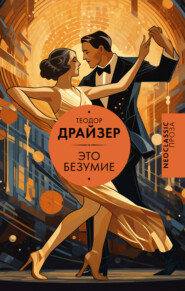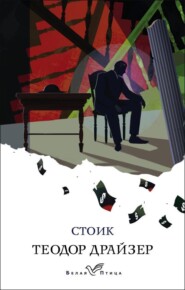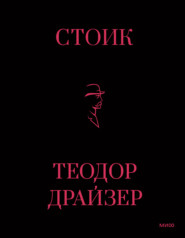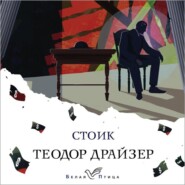По всем вопросам обращайтесь на: info@litportal.ru
(©) 2003-2024.
✖
The "Genius"
Настройки чтения
Размер шрифта
Высота строк
Поля
"Oh, no, you don't mean that, Witla," replied Mathews. "I know what I can do."
Eugene was silent.
"I wish when you get down there," went on Mathews, "you would write us occasionally. I would like to know how you are getting along."
"Sure, I'll write," replied Eugene, flattered by the interest his determination had aroused. "Sure I will." But he never did.
In Ruby and Angela he had two problems to adjust which were not so easy. In the one case it was sympathy, regret, sorrow for her helplessness, her hopelessness. She was so sweet and lovely in her way, but not quite big enough mentally or emotionally for him. Could he really live with her if he wanted to? Could he substitute her for a girl like Angela? Could he? And now he had involved Angela, for since her return to tell him that she accepted him as her affianced lover, there had been some scenes between them in which a new standard of emotion had been set for him. This girl who looked so simple and innocent was burning at times with a wild fire. It snapped in her eyes when Eugene undid her wonderful hair and ran his hands through its heavy strands. "The Rhine Maiden," he would say. "Little Lorelei! You are like the mermaid waiting to catch the young lover in the strands of her hair. You are Marguerite and I Faust. You are a Dutch Gretchen. I love this wonderful hair when it is braided. Oh, sweet, you perfect creature! I will put you in a painting yet. I will make you famous."
Angela thrilled to this. She burned in a flame which was of his fanning. She put her lips to his in long hot kisses, sat on his knee and twined her hair about his neck; rubbed his face with it as one might bathe a face in strands of silk. Finding such a response he went wild, kissed her madly, would have been still more masterful had she not, at the slightest indication of his audacity, leaped from his embrace, not opposition but self protection in her eyes. She pretended to think better of his love, and Eugene, checked by her ideal of him, tried to restrain himself. He did manage to desist because he was sure that he could not do what he wanted to. Daring such as that would end her love. So they wrestled in affection.
It was the fall following his betrothal to Angela that he actually took his departure. He had drifted through the summer, pondering. He had stayed away from Ruby more and more, and finally left without saying good-bye to her, though he thought up to the last that he intended to go out and see her.
As for Angela, when it came to parting from her, he was in a depressed and downcast mood. He thought now that he did not really want to go to New York, but was being drawn by fate. There was no money for him in the West; they could not live on what he could earn there. Hence he must go and in doing so must lose her. It looked very tragic.
Out at her aunt's house, where she came for the Saturday and Sunday preceding his departure, he walked the floor with her gloomily, counted the lapse of the hours after which he would be with her no more, pictured the day when he would return successful to fetch her. Angela had a faint foreboding fear of the events which might intervene. She had read stories of artists who had gone to the city and had never come back. Eugene seemed such a wonderful person, she might not hold him; and yet he had given her his word and he was madly in love with her – no doubt of that. That fixed, passionate, yearning look in his eyes – what did it mean if not enduring, eternal love? Life had brought her a great treasure – a great love and an artist for a lover.
"Go, Eugene!" she cried at last tragically, almost melodramatically. His face was in her hands. "I will wait for you. You need never have one uneasy thought. When you are ready I will be here, only, come soon – you will, won't you?"
"Will I!" he declared, kissing her, "will I? Look at me. Don't you know?"
"Yes! Yes! Yes!" she exclaimed, "of course I know. Oh, yes! yes!"
The rest was a passionate embrace. And then they parted. He went out brooding over the subtlety and the tragedy of life. The sharp October stars saddened him more. It was a wonderful world but bitter to endure at times. Still it could be endured and there was happiness and peace in store for him probably. He and Angela would find it together living in each other's company, living in each other's embrace and by each other's kisses. It must be so. The whole world believed it – even he, after Stella and Margaret and Ruby and Angela. Even he.
The train which bore him to New York bore a very meditative young man. As it pulled out through the great railroad yards of the city, past the shabby back yards of the houses, the street crossings at grade, the great factories and elevators, he thought of that other time when he had first ventured in the city. How different! Then he was so green, so raw. Since then he had become a newspaper artist, he could write, he could find his tongue with women, he knew a little something about the organization of the world. He had not saved any money, true, but he had gone through the art school, had given Angela a diamond ring, had this two hundred dollars with which he was venturing to reconnoitre the great social metropolis of the country. He was passing Fifty-seventh Street; he recognized the neighborhood he traversed so often in visiting Ruby. He had not said good-bye to her and there in the distance were the rows of commonplace, two family frame dwellings, one of which she occupied with her foster parents. Poor little Ruby! and she liked him. It was a shame, but what was he to do about it? He didn't care for her. It really hurt him to think and then he tried not to remember. These tragedies of the world could not be healed by thinking.
The train passed out into the flat fields of northern Indiana and as little country towns flashed past he thought of Alexandria and how he had pulled up his stakes and left it. What was Jonas Lyle doing and John Summers? Myrtle wrote that she was going to be married in the spring. She had delayed solely because she wanted to delay. He thought sometimes that Myrtle was a little like himself, fickle in her moods. He was sure he would never want to go back to Alexandria except for a short visit, and yet the thought of his father and his mother and his old home were sweet to him. His father! How little he knew of the real world!
As they passed out of Pittsburgh he saw for the first time the great mountains, raising their heads in solemn majesty in the dark, and great lines of coke ovens, flaming red tongues of fire. He saw men working, and sleeping towns succeeding one another. What a great country America was! What a great thing to be an artist here! Millions of people and no vast artistic voice to portray these things – these simple dramatic things like the coke ovens in the night. If he could only do it! If he could only stir the whole country, so that his name would be like that of Doré in France or Verestchagin in Russia. If he could but get fire into his work, the fire he felt!
He got into his berth after a time and looked out on the dark night and the stars, longing, and then he dozed. When he awoke again the train had already passed Philadelphia. It was morning and the cars were speeding across the flat meadows toward Trenton. He arose and dressed, watching the array of towns the while, Trenton, New Brunswick, Metuchen, Elizabeth. Somehow this country was like Illinois, flat. After Newark they rushed out upon a great meadow and he caught the sense of the sea. It was beyond this. These were tide-water streams, the Passaic and the Hackensack, with small ships and coal and brick barges tied at the water side. The thrill of something big overtook him as the brakeman began to call "Jersey City," and as he stepped out into the vast train shed his heart misgave him a little. He was all alone in New York. It was wealthy, cold and critical. How should he prosper here? He walked out through the gates to where low arches concealed ferry boats, and in another moment it was before him, sky line, bay, the Hudson, the Statue of Liberty, ferry boats, steamers, liners, all in a grey mist of fierce rain and the tugs and liners blowing mournfully upon great whistles. It was something he could never have imagined without seeing it, and this swish of real salt water, rolling in heavy waves, spoke to him as music might, exalting his soul. What a wonderful thing this was, this sea – where ships were and whales and great mysteries. What a wonderful thing New York was, set down by it, surrounded by it, this metropolis of the country. Here was the sea; yonder were the great docks that held the vessels that sailed to the ports of all the world. He saw them – great grey and black hulls, tied to long piers jutting out into the water. He listened to the whistles, the swish of the water, saw the circling gulls, realized emotionally the mass of people. Here were Jay Gould and Russell Sage and the Vanderbilts and Morgan – all alive and all here. Wall Street, Fifth Avenue, Madison Square, Broadway – he knew of these by reputation. How would he do here – how fare? Would the city ever acclaim him as it did some? He looked wide eyed, with an open heart, with intense and immense appreciation. Well, he was going to enter, going to try. He could do that – perhaps, perhaps. But he felt lonely. He wished he were back with Angela where her soft arms could shut him safe. He wished he might feel her hands on his cheeks, his hair. He would not need to fight alone then. But now he was alone, and the city was roaring about him, a great noise like the sea. He must enter and do battle.
CHAPTER XV
Not knowing routes or directions in New York, Eugene took a Desbrosses Street ferry, and coming into West Street wandered along that curious thoroughfare staring at the dock entrances. Manhattan Island seemed a little shabby to him from this angle but he thought that although physically, perhaps, it might not be distinguished, there must be other things which made it wonderful. Later when he saw the solidity of it, the massed houses, the persistent streams of people, the crush of traffic, it dawned on him that mere humanity in packed numbers makes a kind of greatness, and this was the island's first characteristic. There were others, like the prevailing lowness of the buildings in its old neighborhoods, the narrowness of the streets in certain areas, the shabbiness of brick and stone when they have seen an hundred years of weather, which struck him as curious or depressing. He was easily touched by exterior conditions.
As he wandered he kept looking for some place where he might like to live, some house that had a yard or a tree. At length he found a row of houses in lower Seventh Avenue with an array of iron balconies in front which appealed to him. He applied here and in one house found a room for four dollars which he thought he had better take for the present. It was cheaper than any hotel. His hostess was a shabby woman in black who made scarcely any impression on him as a personality, merely giving him a thought as to what a dreary thing it was to keep roomers and the room itself was nothing, a commonplace, but he had a new world before him and all his interests were outside. He wanted to see this city. He deposited his grip and sent for his trunk and then took to the streets, having come to see and hear things which would be of advantage to him.
He went about this early relationship to the city in the right spirit. For a little while he did not try to think what he would do, but struck out and walked, here, there and everywhere, this very first day down Broadway to the City Hall and up Broadway from 14th to 42nd street the same night. Soon he knew all Third Avenue and the Bowery, the wonders of Fifth Avenue and Riverside Drive, the beauties of the East River, the Battery, Central Park and the lower East Side. He sought out quickly the wonders of metropolitan life – its crowds at dinner and theatre time in Broadway, its tremendous throngs morning and afternoon in the shopping district, its amazing world of carriages in Fifth Avenue and Central Park. He had marveled at wealth and luxury in Chicago, but here it took his breath away. It was obviously so much more fixed, so definite and comprehensible. Here one felt intuitively the far reaches which separate the ordinary man from the scion of wealth. It curled him up like a frozen leaf, dulled his very soul, and gave him a clear sense of his position in the social scale. He had come here with a pretty high estimate of himself, but daily, as he looked, he felt himself crumbling. What was he? What was art? What did the city care? It was much more interested in other things, in dressing, eating, visiting, riding abroad. The lower part of the island was filled with cold commercialism which frightened him. In the upper half, which concerned only women and show – a voluptuous sybaritism – caused him envy. He had but two hundred dollars with which to fight his way, and this was the world he must conquer.
Men of Eugene's temperament are easily depressed. He first gorged the spectacle of life and then suffered from mental indigestion. He saw too much of it too quickly. He wandered about for weeks, looking in the shop windows, the libraries, the museums, the great streets, growing all the while more despondent. At night he would return to his bare room and indite long epistles to Angela, describing what he had seen and telling her of his undying love for her – largely because he had no other means of ridding himself of his superabundant vitality and moods. They were beautiful letters, full of color and feeling, but to Angela they gave a false impression of emotion and sincerity because they appeared to be provoked by absence from her. In part of course they were, but far more largely they were the result of loneliness and the desire for expression which this vast spectacle of life itself incited. He also sent her some tentative sketches of things he had seen – a large crowd in the dark at 34th Street; a boat off 86th Street in the East River in the driving rain; a barge with cars being towed by a tug. He could not think exactly what to do with these things at that time, but he wanted to try his hand at illustrating for the magazines. He was a little afraid of these great publications, however, for now that he was on the ground with them his art did not appear so significant.
It was during the first few weeks that he received his only letter from Ruby. His parting letter to her, written when he reached New York, had been one of those makeshift affairs which faded passion indites. He was so sorry he had to leave without seeing her. He had intended to come out but the rush of preparation at the last moment, and so forth; he hoped to come back to Chicago one of these days and he would look her up. He still loved her, but it was necessary for him to leave – to come where the greatest possibilities were. "I remember how sweet you were when I first saw you," he added. "I shall never forget my first impressions, little Ruby."
It was cruel to add this touch of remembrance, but the artist in him could not refrain. It cut Ruby as a double edged sword, for she understood that he cared well enough that way – æsthetically. It was not her but beauty that he loved, and her particular beauty had lost its appeal.
She wrote after a time, intending to be defiant, indifferent, but she really could not be. She tried to think of something sharp to say, but finally put down the simple truth.
"Dear Eugene: " she wrote, "I got your note several weeks ago, but I could not bring myself to answer it before this. I know everything is over between us and that is all right, for I suppose it has to be. You couldn't love any woman long, I think. I know what you say about your having to go to New York to broaden your field is true. You ought to, but I'm sorry you didn't come out. You might have. Still I don't blame you, Eugene. It isn't much different from what has been going on for some time. I have cared but I'll get over that, I know, and I won't ever think hard of you. Won't you return me the notes I have sent you from time to time and my pictures? You won't want them now.
"Ruby."
There was a little blank space on the paper and then: —
"I stood by the window last night and looked out on the street. The moon was shining and those dead trees were waving in the wind. I saw the moon on that pool of water over in the field. It looked like silver. Oh, Eugene, I wish I were dead."
He jumped up as he read these words and clenched the letter in his hands. The pathos of it all cut him to the quick, raised his estimate of her, made him feel as if he had made a mistake in leaving her. He really cared for her after all. She was sweet. If she were here now he could live with her. She might as well be a model in New York as in Chicago. He was on the verge of writing this, when one of the long, almost daily epistles Angela was sending arrived and changed his mood. He did not see how, in the face of so great and clean a love as hers, he could go on with Ruby. His affection had obviously been dying. Should he try to revive it now?
This conflict of emotions was so characteristic of Eugene's nature, that had he been soundly introspective, he would have seen that he was an idealist by temperament, in love with the æsthetic, in love with love, and that there was no permanent faith in him for anybody – except the impossible she.
As it was, he wrote Ruby a letter breathing regret and sorrow but not inviting her to come. He could not have supported her long if she had, he thought. Besides he was anxious to secure Angela. So that affair lapsed.
In the meantime he visited the magazine offices. On leaving Chicago he had put in the bottom of his trunk a number of drawings which he had done for the Globe– his sketches of the Chicago River, of Blue Island Avenue, of which he had once made a study as a street, of Goose Island and of the Lake front. There were some street scenes, too, all forceful in the peculiar massing of their blacks, the unexpected, almost flashing, use of a streak of white at times. There was emotion in them, a sense of life. He should have been appreciated at once, but, oddly, there was just enough of the radically strange about what he did to make his work seem crude, almost coarse. He drew a man's coat with a single dash of his pen. He indicated a face by a spot. If you looked close there was seldom any detail, frequently none at all. From the praise he had received at the art school and from Mathews and Goldfarb he was slowly coming to the conclusion that he had a way of his own. Being so individual he was inclined to stick to it. He walked with an air of conviction which had nothing but his own belief in himself to back it up, and it was not an air which drew anybody to him. When he showed his pictures at the Century, Harper's, Scribner's, they were received with an air of weary consideration. Dozens of magnificent drawings were displayed on their walls signed by men whom Eugene now knew to be leaders in the illustration world. He returned to his room convinced that he had made no impression at all. They must be familiar with artists a hundred times better than himself.
As a matter of fact Eugene was simply overawed by the material face of things. These men whose pictures he saw displayed on the walls of the art and editorial rooms of the magazines were really not, in many instances, any better than himself, if as good. They had the advantage of solid wood frames and artistic acceptance. He was a long way as yet from magazine distinction but the work he did later had no more of the fire than had this early stuff. It was a little broader in treatment, a little less intolerant of detail, but no more vigorous if as much so. The various art directors were weary of smart young artists showing drawings. A little suffering was good for them in the beginning. So Eugene was incontinently turned away with a little faint praise which was worse than opposition. He sank very low in spirits.
There were still the smaller magazines and the newspapers, however, and he hunted about faithfully, trying to get something to do. From one or two of the smaller magazines, he secured commissions, after a time, three or four drawings for thirty-five dollars; and from that had to be extracted models' fees. He had to have a room where he could work as an artist, receiving models to pose, and he finally found one in West 14th Street, a back bedroom, looking out over an open court and with a public stair which let all come who might without question. This cost him twenty-five dollars a month, but he thought he had better risk it. If he could get a few commissions he could live.
CHAPTER XVI
The art world of New York is peculiar. It was then and for some time after, broken up into cliques with scarcely any unity. There was a world of sculptors, for instance, in which some thirty or forty sculptors had part – but they knew each other slightly, criticised each other severely and retired for the most part into a background of relatives and friends. There was a painting world, as distinguished from an illustrating world, in which perhaps a thousand alleged artists, perhaps more, took part. Most of these were men and women who had some ability – enough to have their pictures hung at the National Academy of Design exhibition – to sell some pictures, get some decorative work to do, paint some portraits. There were studio buildings scattered about various portions of the city; in Washington Square; in Ninth and Tenth Streets; in odd places, such as Macdougal Alley and occasional cross streets from Washington Square to Fifty-ninth Street, which were filled with painters, illustrators, sculptors and craftsmen in art generally. This painting world had more unity than the world of sculptors and, in a way, included the latter. There were several art clubs – the Salmagundi, the Kit-Kat and the Lotus – and there were a number of exhibitions, ink, water color, oil, with their reception nights where artists could meet and exchange the courtesies and friendship of their world. In addition to this there were little communal groups such as those who resided in the Tenth Street studios; the Twenty-third Street Y. M. C. A.; the Van Dyck studios, and so on. It was possible to find little crowds, now and then, that harmonized well enough for a time and to get into a group, if, to use a colloquialism, one belonged. If you did not, art life in New York might be a very dreary thing and one might go a long time without finding just the particular crowd with which to associate.
Beside the painting world there was the illustrating world, made up of beginners and those who had established themselves firmly in editorial favor. These were not necessarily a part of the painting or sculpture worlds and yet, in spirit, were allied to them, had their clubs also, and their studios were in the various neighborhoods where the painters and sculptors were. The only difference was that in the case of the embryo illustrators they were to be found living three or four in one studio, partly because of the saving in expense, but also because of the love of companionship and because they could hearten and correct one another in their work. A number of such interesting groups were in existence when Eugene arrived, but of course he did not know of them.
It takes time for the beginner to get a hearing anywhere. We all have to serve an apprenticeship, whatever field we enter. Eugene had talent and determination, but no experience, no savoir faire, no circle of friends and acquaintances. The whole city was strange and cold, and if he had not immediately fallen desperately in love with it as a spectacle he would have been unconscionably lonely and unhappy. As it was the great fresh squares, such as Washington, Union and Madison; the great streets, such as Broadway, Fifth Avenue and Sixth Avenue; the great spectacles, such as the Bowery at night, the East River, the water front, the Battery, all fascinated him with an unchanging glamor.
He was hypnotized by the wonder of this thing – the beauty of it. Such seething masses of people! such whirlpools of life! The great hotels, the opera, the theatres, the restaurants, all gripped him with a sense of beauty. These lovely women in magnificent gowns; these swarms of cabs, with golden eyes, like monstrous insects; this ebb and surge of life at morning and evening, made him forget his loneliness. He had no money to spend, no immediate hope of a successful career, he could walk these streets, look in these windows, admire these beautiful women; thrill at the daily newspaper announcements of almost hourly successes in one field or another. Here and there in the news an author had made a great success with a book; a scientist with a discovery; a philosopher with a new theory; a financier with an investment. There was news of great plays being put on; great actors and actresses coming from abroad; great successes being made by débutantes in society; great movements forwarded generally. Youth and ambition had the call – he saw that. It was only a question of time, if you had talent, when you would get your hearing. He longed ardently for his but he had no feeling that it was coming to him quickly, so he got the blues. It was a long road to travel.
One of his pet diversions these days and nights was to walk the streets in rain or fog or snow. The city appealed to him, wet or white, particularly the public squares. He saw Fifth Avenue once in a driving snowstorm and under sputtering arc lights, and he hurried to his easel next morning to see if he could not put it down in black and white. It was unsuccessful, or at least he felt so, for after an hour of trying he threw it aside in disgust. But these spectacles were drawing him. He was wanting to do them – wanting to see them shown somewhere in color. Possible success was a solace at a time when all he could pay for a meal was fifteen cents and he had no place to go and not a soul with whom to talk.
It was an interesting phase of Eugene's character that he had a passion for financial independence. He might have written home from Chicago at times when he was hard pressed; he might have borrowed some money from his father now, but preferred to earn it – to appear to be further along than he was. If anyone had asked him he would have said he was doing fine. Practically he so wrote to Angela, giving as an excuse for further delay that he wanted to wait until he had ample means. He was trying all this time to make his two hundred dollars go as far as possible and to add to it by any little commissions he could get, however small. He figured his expenses down to ten dollars a week and managed to stay within that sum.
The particular building in which he had settled was really not a studio building but an old, run-down boarding and apartment house turned partially to uses of trade. The top floor contained three fair sized rooms and two hall bedrooms, all occupied by lonely individuals plying some craft or other. Eugene's next door neighbor chanced to be a hack illustrator, who had had his training in Boston and had set up his easel here in the hope of making a living. There were not many exchanges of courtesies between them at first, although, the door being open the second day he arrived, he saw that an artist worked there, for the easel was visible.
No models applying at first he decided to appeal to the Art Students' League. He called on the Secretary and was given the names of four, who replied to postal cards from him. One he selected, a young Swedish American girl who looked somewhat like the character in the story he had in mind. She was neat and attractive, with dark hair, a straight nose and pointed chin, and Eugene immediately conceived a liking for her. He was ashamed of his surroundings, however, and consequently diffident. This particular model was properly distant, and he finished his pictures with as much expedition and as little expense as he possibly could.
Eugene was not given to scraping odd acquaintances, though he made friends fast enough when the balance of intellect was right. In Chicago he had become friendly with several young artists as a result of working with them at the Institute, but here he knew no one, having come without introductions. He did become acquainted with his neighbor, Philip Shotmeyer. He wanted to find out about local art life from him, but Shotmeyer was not brilliant, and could not supply him with more than minor details of what Eugene desired to know. Through him he learnt a little of studio regions, art personalities; the fact that young beginners worked in groups. Shotmeyer had been in such a group the year before, though why he was alone now he did not say. He sold drawings to some of the minor magazines, better magazines than Eugene had yet had dealings with. One thing he did at once for Eugene which was very helpful: he admired his work. He saw, as had others before him, something of his peculiar distinction as an artist, attended every show and one day he gave him a suggestion which was the beginning of Eugene's successful magazine career. Eugene was working on one of his street scenes – a task which he invariably essayed when he had nothing else to do. Shotmeyer had drifted in and was following the strokes of his brush as he attempted to portray a mass of East Side working girls flooding the streets after six o'clock. There were dark walls of buildings, a flaring gas lamp or two, some yellow lighted shop windows, and many shaded, half seen faces – bare suggestions of souls and pulsing life.
"Say," said Shotmeyer at one point, "that kind o' looks like the real thing to me. I've seen a crowd like that."
"Have you?" replied Eugene.
"You ought to be able to get some magazine to use that as a frontispiece. Why don't you try Truth with that?"
"Truth" was a weekly which Eugene, along with many others in the West, had admired greatly because it ran a double page color insert every week and occasionally used scenes of this character. Somehow he always needed a shove of this kind to make him act when he was drifting. He put more enthusiasm into his work because of Shotmeyer's remark, and when it was done decided to carry it to the office of Truth. The Art Director approved it on sight, though he said nothing, but carried it in to the Editor.
"Here's a thing that I consider a find in its way."

















